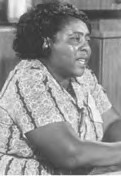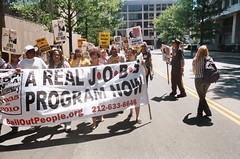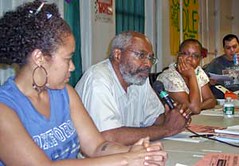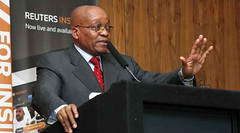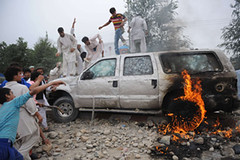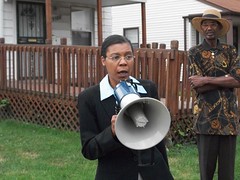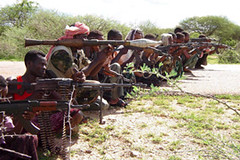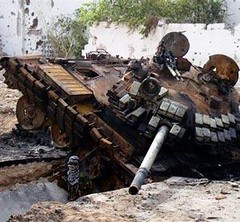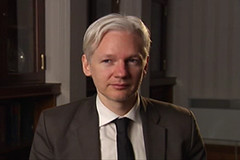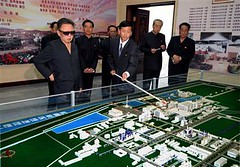Blowing the whistle
By Andrew Fowler
Reprinted From Al Jazeera
Check out http://www.WikiLeaks.org
The leak of more than 90,000 US military files by whistle-blower website, WikiLeaks is one of the biggest in US military history.
The London press conference by Julian Assange was also a rare public appearance for the WikiLeaks founder who has been dubbed "one of the most dangerous men in the world" by critics. To supporters he is a hero, the godfather of whistleblowers.
But what of Assange and his organisation? The US authorities have made it plain they would like to talk to him about the leaks. But as Australian reporter Andrew Fowler explains so far he has proved elusive.
It used to be nondescript parcels on the doorstep, cryptic phone calls at midnight or shadowy meetings in underground car parks. Now explosive information is more likely to arrive - to the tune of a novelty sound effect - in an email.
But profound and important questions surround the transaction of secret, highly sensitive, classified material. Governments and big business are fiercely protective of their internal dynamics and are increasingly coming down hard on leakers and whistleblowers.
The public though demand and defend their right to know when governments they have installed are making decisions on their behalf, or the actions of big business impact their lives. And so a group of one-time hackers and activists are trying to build a global truth machine: WikiLeaks.
Is the founder of WikiLeaks now one of the most dangerous men in the world?
WikiLeaks founder Julian Assange, a hesitant, quietly spoken Australian, has become the global face of a nebulous operation with secret computer servers in a number of countries and aspirations to build an information freedom zone - the leaker's equivalent of a tax haven - in Iceland.
WikiLeaks exploded into prominence earlier this year when it released hitherto top secret video of a helicopter gunship strafing and killing more than a dozen people in Baghdad including media covering the war. The footage caused outrage around the world.
The Wiki-team spent some time stripping the video of any electronic fingerprints that would expose the insiders who leaked it and then launched it online under the banner Collateral Murder replete with damning Orwellian quotes.
Critics call this reckless, potentially dangerous activism not journalism.
The WikiLeaks exclusive illuminated the failures of the mainstream media and made Assange an enemy of the US government.
"Leaking is inherently an anti-authoritarian act. It is inherently an anarchist act," Assange says.
Cracking down
Assange's hero, Daniel Ellsberg, famous for outing US government lies about the Vietnam War, was once called the most dangerous man in the US.
"I believe that Barack Obama was lying when he implied to the public in his State of the Union Message, just like Lyndon Johnson in '65 that there was a limit, a low limit to what he's going to put into Afghanistan," Ellsberg says.
"I'm sure it's a high priority for them to try to neutralise him one way or another and I wouldn't exclude physical danger, but in particular, trying to find ways that discredit him or to keep him from communicating with possible sources, is a very high priority for them."
Ellsberg should know. In 1971 he leaked the Pentagon papers. Until recently, he was one of the few US government employees ever to be prosecuted for leaking. But the Obama administration is cracking down on whistle-blowers. In 17 months it has outdone all previous administrations in pursuing leakers.
"The Obama administration is as secretive as the Bush administration in matters of so-called national security, in matters of war and peace and aggression and in many cases have gone beyond Bush, so I hope that in the future WikiLeaks will induce a great deal more leaking," Ellsberg says.
For the past three years WikiLeaks has challenged governments everywhere - outing human rights violations in Guantanamo Bay, exposing political murders in Africa and banks laundering money through off shore tax havens.
WikiLeaks has hit the political left and right and won media awards from Amnesty International and the Economist magazine.
Naturally enough WikiLeaks is very guarded and difficult to track down. Arranging meetings involves a lot of cloak and dagger - conversations in lifts so no one can be bugged, locations and times of meetings shift at the last minute.
"It may seem elaborate to you but it just seems every day to me. The issue is not my safety. Rather the issue is the safety of our sources, so there's some simple precautions but it's enough to make it costly and inconvenient to spy on us and try and find out who our sources are," Assange says.
WikiLeaks built an information system it thinks is foolproof. Instead of secret documents physically changing hands, they are anonymously sent to digital drop boxes and stored on servers around the world. Finally they are posted on the WikiLeaks site.
"What we want to create is a system where there is guaranteed free press across the world, the entire world, that every individual in the world has the ability to publish materials that are meaningful," Assange says.
"We are kept honest by the fact that we release primary source material and journalists who base their articles on us, on our materials are also kept honest because readers can check ... [what] the primary source[s] say."
Teenage hackers club
In 1989, the teenage hackers club around Assange targeted the US space mission
It has been a meteoric ride to the top for Assange. His WikiLeaks idea grew out of a Melbourne teenage computer hackers club in the 1980s known as the International Subversives.
In October 1989 the hackers targeted the US space mission.
"This kind of an attack was really something that nobody thought was going to happen and later we would describe things as an electronic Pearl Harbour," Ron Tencati, a former manager of NASA Cyber security, says.
Tencati was on duty at NASA control when the computers went haywire. As control staff prepared for the launch of the nuclear powered Galileo probe aboard the Atlantis Space Shuttle, the word 'WANK' stared back at them from their screens.
"When you see this banner that says 'Worms Against Nuclear Killers' and, you know, we at the time at NASA we had a shuttle on the launch pad about to launch that had plutonium energy canisters for its power source. If this blew up like the Challenger did, all of this plutonium is going to kill everybody in Florida," Tencati says.
One clue to where the attack came from appeared at the bottom of the screen, the lyrics of Australian rock band Midnight Oil: "You talk of times of peace for all and then prepare for war."
Assange was part of the hacker club, but specifically denies being involved in the NASA attack. Nevertheless, police attention focused on his activities. Ken Day was part of the investigating team.
"He was monitoring what we were up to and knew that we would be coming some time, but we were monitoring him monitoring us so we were one step ahead of him. For Julian Assange and all the hackers it was ego. They were there in a very new field and they had to prove they were the best," Day says.
Police tracked Assange's hacking to Melbourne's main telephone exchange. He was piggy-backing on its computer power to launch his overseas adventures.
He was charged with computer offences, but the court let him off with a fine and a suspended sentence.
By then Assange had felt the power and the scope of a developing network.
"To be exploring the world and being involved in international politics from your bedroom, it was certainly a feeling that you were on the right path, that this was an extremely educational experience and you were able to do a little bit about the things that were pissing you off," Assange says.
Iceland is WikiLeak's spiritual home
Fast-track 20 years, WikiLeaks is a powerful global force, but if there is an HQ you will not find it in Melbourne, New York or London. Its spiritual home is Iceland.
"It is a safe haven more for journalism in general, for in particular investigative journalism and also for people that, for example, risk their lives from China or Sri Lanka to publish information about the situation, might risk being tortured or killed and their story also vanishing," Birgitta Jónsdóttir, a member of Iceland's parliament, says.
Urged on by the likes of Assange and others, Jónsdóttir was at the forefront of a push to change the country's media laws, transforming it into an information freedom zone.
"It's the same sort of idea as they use with great success in the tax havens around the world," she says.
And so Iceland would be the launch pad for Wiki's defining leak. Journalists, politicians and others were ushered into a preview screening of a video that would soon rock the rest of the world.
"I was shown it at a café here and was completely shocked and I was sitting there crying like many people do when they see it for the first time," Jónsdóttir says.
A top secret US video shot from a military helicopter showed people gunned down in a hail of cannon shells in East Baghdad.
WikiLeaks formed an impromptu alliance with old media - a local TV channel and one of its journalists, Kristinn Hrafnsson.
"Julian Assange showed me the Iraqi video a few weeks prior to its release. That's the first time I saw that video of the killing in Baghdad. I thought it was essential to find the identity of the people who were killed, to get their story basically, what they were doing there in the square that day," Hrafnsson says.
Hrafnsson and his TV crew tracked down the family of the mini-van driver, Saleh Matasher Tomals for their side of the story.
"This was a guy who was basically dropping his kids to a special tutoring and picked up a neighbour on the way and gave him a lift and he just stopped to help somebody who was bleeding to death on the kerb," Hrafnsson says.
"He was killed that day. He got 30mm explosive rounds straight in the chest and his two children were wounded heavily, they were in the front of the car with him. I met all the children and the widow."
The WikiLeaks video made headlines around the world, but it had not been seen where it would have its most devastating impact - in this small Iraqi home.
When the Iceland TV crew showed the family the video, they were grief stricken but they were at last able to piece together a little more of the puzzle.
Old vs. new media
But for some the Iraq video was not new. Washington Post journalist, David Finkel was embedded with US troops in Baghdad that day.
"What happened that day was part of a large operation where soldiers I was writing about for my book, The Good Soldiers, were trying to clear out an area that over the previous weeks had been especially vicious, several soldiers had been killed by roadside bombs, and there had been a number of catastrophic injuries," Finkel says
He is critical of WikiLeaks not providing what he says is the correct context. He is among those who accuse WikiLeaks of putting its own ideological spin on the video.
"They provided artificial agenda driven context. It comes up on a site called Collateral Murder, which gives it a certain feel to a viewer coming into it and before you see the video there's this great George Orwell quote providing the context.
"The context of that day was not what George Orwell had to say so many years before, the context was that there was an operation under way in reaction to an ongoing war, not that Apache helicopters were circling looking for a bunch of guys to just shoot up and kill."
Ellsberg disagrees: "It would be interesting to have someone speculate or tell us exactly what context would lead to justifying the killing that we see on the screen. As the killing goes on, you're obviously seeing the killing of men who are lying on the ground in an operation where ground troops are approaching and are perfectly capable of taking those people captive, but meanwhile you're murdering them before the troops arrive. That's a violation of the laws of war, and of course what the mainstream media have omitted from their stories is this context."
For WikiLeaks and its supporters, the video defined the difference between the old guard and the new. After all, the Washington Post's David Finkel in his book, The Good Soldiers, gives a word accurate recount of the cockpit conversation you hear in the video. Had he seen it, and if he had why didn't his paper, famous for Watergate, the biggest political expose in US history, investigate the killings?
"Finkel had seen it but we know that at least one member, I won't mention their name, had that video at the Washington Post. Retained ... for at least the past year," Assange says.
The Washington Post denies having a copy of the video.
"Unfortunately, typical of newspapers, they don't follow up these atrocities. Things that are extremely critical of the administration only get you in trouble with the White House if you seem to be obsessed by them and pursue them," Ellsberg says.
"I haven't seen anyone raise the question now of why, on what basis, that video was denied to Reuters, who were after all interested in the circumstances under which two of their journalists had been killed. Now, have you seen anyone raise the question, all right now we have the video, what was the basis for denying this? How does it hurt national security?"
WikiLeaks subscribes to traditional journalistic principles when it comes to protecting its sources.
"All that we can guarantee is that we won't be the source of the problem. I mean, coming in through us, we're going to protect them and that if they are exposed, then we'll fight like hell to bring attention to their plight and we'll send lawyers, and cash if necessary, to try and get them out of that bad situation," Assange says.
Targeting the sources
Two years ago a secret US intelligence report recommended targeting WikiLeaks' sources. Washington administration officials do not see the public interest in the Iraq video or anything else WikiLeaks might be about to unleash.
"We take the reports of the deliberate, unauthorised disclosure of classified state department cables and materials very seriously. And the security of these materials is our highest priority," Philip Crowley, a US state department spokesperson, says.
The video release triggered a major investigation but strangely the biggest breakthrough did not come from crack police work but from a former hacker named Adrian Lamo who we tracked down on Skype.
If Adrian Lamo is to be believed, he casually found himself chatting online to a man claiming to be a military insider. The insider was bragging about leaking the video and a truckload of other national security documents to WikiLeaks.
"He proceeded to identify himself as an intelligence analyst and posed the question, well what would you do if you had unprecedented access to classified data 14 hours a day, seven days a week," Lamo says.
Instead of celebrating the insider's cyber heroics as a fellow traveller might, Lamo blew the whistle and 22-year-old Bradley Manning, an intelligence officer based in Baghdad, was arrested.
"He was firing bullets into the air without thought to consequence of where they might land or who they might hit," Lamo says.
World's most dangerous man?
The bigger concern for authorities is 'what else?' Did Manning leak a library of other classified material to WikiLeaks and what is its next shot in the locker?
Julian Assange is cryptic, he is not giving anything away yet.
"I'm not commenting, but its not any one operation," Assange says.
"Well, it's something involving, you know, it's not this [a mass bombing that took place or a financial expose] but I can give an analogy. If there had been mass spying that had affected many, many people in organisations and the details of that mass spying were released, then that is something that would reveal that the interests of many people had been abused."
Is Assange a wanted man? There is no official word on that, but strangely one man who hunted him, Ken Day, now wishes him the best.
"I think one of the strengths of democracy is having a strong media, an independent voice to actually challenge what government and corporate worlds are doing. I think we've lost a lot of that in recent years. And so I, at a very high level, I would support what he is doing to support transparency, but I will caution there are always inherent dangers in how it is done, but I think it is great," Day says.
And Ellsberg, the one time world title-holder in the expose business appears happy to pass the mantle on to a new generation.
"He is not only a danger to governments, to withholding wrongfully information ... so yes I think he is a good candidate for being the most dangerous man in the world in the eyes of people like the one who gave me that award."
Ellsberg says: "I'm sure that Assange is now regarded as one of the very most dangerous men and he should be quite proud of that."


